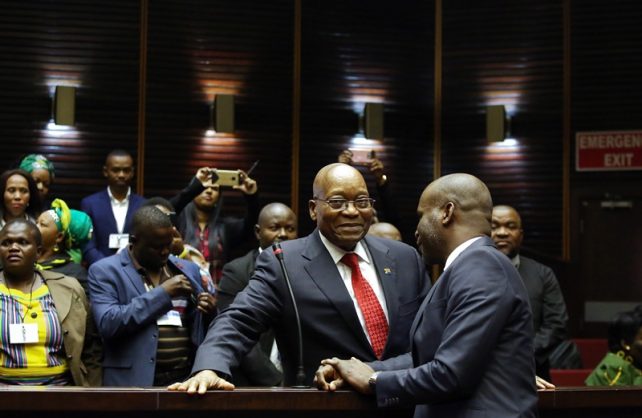Riyaz Patel
Former ANC MP Andrew Feinstein, who consistently raised the issue of the arms deal in Parliament and maintained the Seriti commission was flawed, hailed the High Court judgment setting aside the Commission’s findings into the R30bn arms deal as an important legal moment as South Africa attempts to recover from state capture.
“The Arms Deal ushered a corrupt network into this country’s democratic politics and paved the way for contemporary state capture.”
Andrew Feinstein, Paul Holden, and Hennie van Vuuren.
“The Arms Deal ushered a corrupt network into this country’s democratic politics and paved the way for contemporary state capture. If we are to challenge state capture in the present, we must acknowledge and seek justice for those instances of state capture from the past, and learn lessons for the future,” Feinstein said in a joint op-ed with author Paul Holden and anti-corruption activist Hennie van Vuuren.
Feinstein said should the corruption case against Jacob Zuma proceed to trial, the former president will no longer be able to use the arms deal commission of inquiry –which found that there was no evidence against him– as a defence.
“The significance of this decision is that Jacob Zuma and Thales will not be able to use the report of the Seriti commission when they go on trial.”

Zuma faces serious charges, including one count of racketeering, corruption, money laundering and fraud, relating to 783 payments he allegedly received in connection with the controversial arms deal.
“Their (European companies) corruption was cold, premeditated and scandalous.”
French arms company Thales has also been charged.
In May this year, Zuma applied for a permanent stay of prosecution.
Judgment in that application has not yet been handed down by the KwaZulu-Natal High Court in Pietermaritzburg.
The Commission, which Zuma set up in 2011 and chaired by Judge Willie Seriti, found no evidence of wrongdoing against Zuma, nor in the deal, in which the government entered into multibillion-rand military acquisition contracts with several European defence companies.
The contracts were finalised in 1999.
“So manifest a set of errors of law, a clear failure to test evidence of key witnesses, a refusal to take account of documentary evidence which contained the most serious allegations which were relevant to its inquiry.”
High Court Judge President Dunstan Mlambo
Following the judgment, the National Prosecuting Authority (NPA) must also investigate and charge all the others involved in corruption in the deal, including prominent South Africans and international arms companies BAE Systems, Thyssen Krupp, Ferrostaal, Thales and Saab, Feinstein added.
In summarising his findings Wednesday, High Court Judge President Dunstan Mlambo damningly found that: “So manifest a set of errors of law, a clear failure to test evidence of key witnesses, a refusal to take account of documentary evidence which contained the most serious allegations which were relevant to its inquiry, the principle of legality dictates only one conclusion, that the findings of such a commission must be set aside.”
“The Seriti commission, however, is only the most recent development in the two-decade long story of impunity and cover-ups that has marked the Arms Deal.”
Feinstein, Holden and van Vuuren
“This year marks two decades since the infamous deal was concluded by Thabo Mbeki’s administration. Detailed evidence of corruption emerged from even before the conclusion of the contracts.
“Since then, multiple investigations in South Africa and abroad have uncovered ‘commission payments’ to politically connected agents worth hundreds of millions of dollars,” Feinstein,Holden and van Vuuren, said in the op-ed.
“All of these investigations ultimately went the way of the Seriti commission – derailed through disinterest, political interference, name-calling and capitulation in the face of political power,” they wrote further.
“It is equally important that those European companies that sought to corrupt our new democracy and thereby steal scarce public resources from the poor and unemployed also face the full might of the law. Their corruption was cold, premeditated and scandalous,” they said further.
